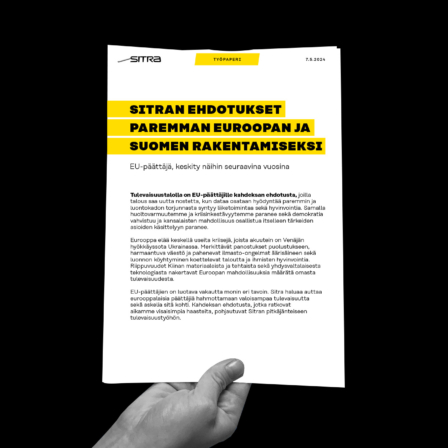One question entered into the AI tool ChatGPT currently consumes about ten times the energy of a single Google search. Training large language models (such as GPT-3) can consume millions of litres of fresh water to cool data centres, depending on where in the world the language model is located.
In the future, the energy consumption of AI is expected to increase even further. For example, Google’s emissions have increased by 48 % in the past five years. The increase in emissions is largely due to the growing need for the computing power required to train and run generative AI Generative AI; creative AI; productive AI An AI (artificial intelligence) model that creates new content in the form of written text, sound, images, or video. Models are trained on vast amounts of example data and operate by analysing features of this data. Open term page Generative AI; creative AI; productive AI , which is reflected in the growing energy use of data centres.
Despite the increasing energy demand and the negative environmental impact, Europe, along with others, needs to invest in the strategic development of generative AI. Competitive and reliable European language models are important for building new applications and commercial services. However, the development of generative AI should not be an end in itself, but rather the goal should be that generative AI is developed in a way that is environmentally and socially sustainable.
The AI Act is just the beginning in reducing the environmental impact of AI
The challenge for the next EU Commission will be to ensure that policy measures are in place to tie the increased demand for computing capacity created by generative AI to sustainable and renewable energy. The European Commission’s AI Act, which entered into force on 1 August 2024, responds to this challenge by promoting the development of AI in a socially and environmentally responsible way, in line with European values. This can translate into a competitive advantage for European operators.
As part of the implementation of the AI Act, the Commission’s role is to ensure that companies and public authorities can choose the AI models to be deployed in the EU market in an environmentally responsible way.
Through the AI Act, the Commission aims to improve the resource efficiency of AI systems through standardisation and four-yearly evaluation reviews. The Act defines a framework, which will be complemented by standards. For example, providers of general-purpose AI models will have to report on the energy used by the systems or estimate energy use according to the computing power required.
However, there is a lack of concrete evidence on sustainable AI development and how to reduce its environmental impact. For example, the AI Act does not define penalties for high energy consumption and does not provide concrete approaches for reducing emissions. For example, the EU should define principles for the deployment of high energy consumption models to avoid unnecessary deployment in cases where lower consumption AI systems are feasible.
The European Commission will further clarify the content of the AI Act, such as risk categories and voluntary codes of conduct, through adopting the so-called delegated acts complementing the Act. Among the voluntary codes of conduct, one relates to the assessment of the environmental impact of AI systems, for example in energy-efficient programming (such as green code). The development of binding delegated acts is a political process, with the possibility of consulting businesses.
Europe needs a public debate on the future of AI
The AI Act takes into account AI in the regulation of energy consumption, but its entry into force is not in itself sufficient to create more environmentally friendly AI systems. The implementation of the regulation will require a comprehensive effort from both the EU and the member states.
Once the AI Act enters into force, the Commission and EU member states will need to pay particular attention to communicating the changes in the environment that will result from the regulation. The Commission must support companies in mastering the new legislation and in the sustainable and competitive development of AI. In addition, the Commission should in the future take into account not only energy consumption but also other environmental impacts of AI technologies in its legislation and recommendations.
The debate on AI must also include environmental considerations, so that they do not remain a side issue in the future. They should be given a place in the public debate. Users must also be provided with more information on the environmental impact of AI and opportunities to influence the development of the technology.
You may also be interested in
Read more
Sitra’s recommendations to the incoming Commission


